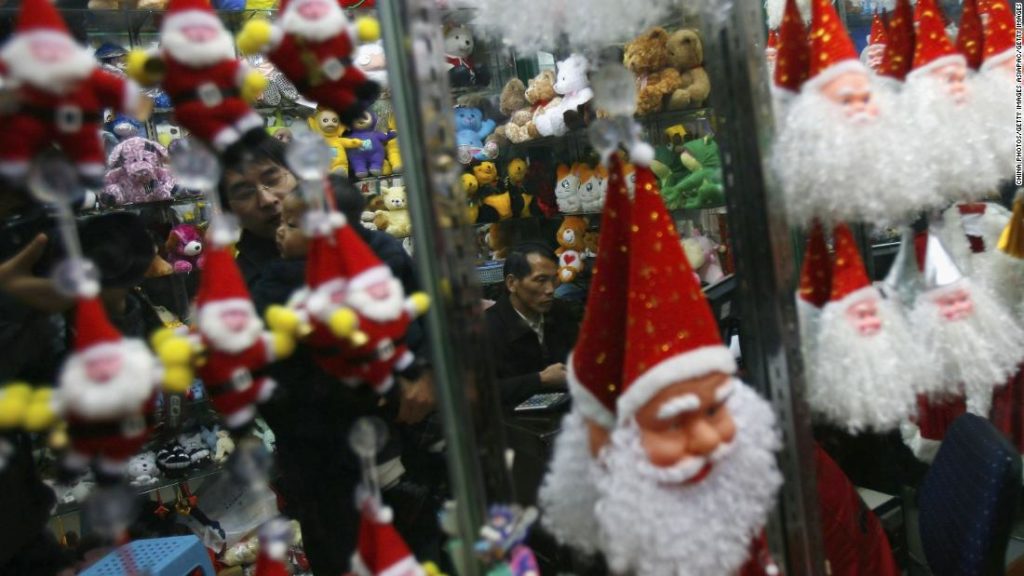But production almost stopped in mid-December, as local authorities switched off the lights.
Ma Hairu, who works for a manufacturer making paper decorations for Christmas and New Year, said his factory was struggling to meet demand because they’re only allowed to work half days. “We have a lot of orders, but we don’t have enough time to make them,” he said.
Officials in China’s Zhejiang province are racing to meet five-year energy consumption targets set by the central government that are due to expire on December 31. Earlier this month, a local directive instructed businesses to stop elevators below the third floor, and to only use heating when temperatures outside fell below 3 degrees Celsius (37 degrees Fahrenheit).
“There is no shortage of electricity supply [in Zhejiang]. Some places in the province adopted measures themselves to restrict electricity use to save energy and reduce emissions,” Zhao Chenxin, secretary general of the National Development and Reform Commission (NDRC), said Monday.
The drive to cut energy consumption has disrupted millions of lives. In Yiwu, a city of a million people, heating was turned off in offices, shopping malls, schools and hospitals, despite daytime temperatures of about 10 degrees Celsius (50 degrees Fahrenheit).
Zhejiang’s abrupt cut in electricity consumption highlights both the strength and pitfalls of China’s political system. While the Communist Party can make ambitious promises to cut carbon emissions, the forceful implementation of targets can come at a cost to the people they are ultimately meant to benefit.
“A difficult year”
Some accused the Yiwu government of sacrificing public safety to tick a box on a political report card.
Following the online backlash, officials turned some lights back on. “The lights were only off for a few days. Most of them have been turned on now,” a government hotline operator told CNN on Wednesday.
But other restrictions remain in place. Yin Mingfei, a manager of a cafe in a shopping center in the city’s central business district, said the heating had been switched off for nearly two weeks, and electronic advertising billboards and escalators weren’t working.
The city’s factories and workshops, whose businesses have already suffered from the coronavirus pandemic earlier this year, were ordered to reduce or halt production at a time when orders are flooding in.
December would have been the busiest time of the year for Liu Lei, who runs a small workshop with his wife in a Yiwu suburb making red envelopes for the Lunar New Year. But he has been ordered to work two days on, two days off until the end of the year to save power.
“Of course the impact [on my business] is huge. The orders are rushing in for red envelopes, but there’s no way I can make enough,” Liu said. “So I had to turn some down.”
Target-oriented political culture
Similar scrambles have happened in the past — on a much larger scale and for many more months. In 2010, the final year of China’s 11th five-year plan, Zhejiang and more than half a dozen other provinces rolled out measures to restrict electricity use.
“This is common in China. It’s a result of the target-oriented political culture,” said Trey McArver, partner at Beijing-based consultancy Trivium.
Without democratic elections, most Chinese officials climb the political career ladder in a performance-based evaluation system, where targets on economic growth, social stability and, increasingly, environmental protection, play an important role in their chances of promotion.
Under Xi’s authoritarian rule, local officials are placed under even more pressure — filtered down from the central government — to meet Beijing’s policy targets, such as those set out in the country’s five-year plans.
Five-year plans are a legacy of China’s command economy during the Mao era. These top-level policy blueprints lay out the country’s social and economic development goals for the coming period. The 13th five-year plan covers 2016 to 2020.
Competing targets
The province is only allowed to consume an equivalent of 23.8 million tonnes of coal above 2015 levels by 2020, however there are indications it was using too much.
The problem with targets is there are often more than one for officials to meet and they are not always complementary, said McArver, the consultant. “The reason that there’s a scramble to meet these targets here at the end is because local officials have been focused primarily on other targets as of now,” he said, such as GDP growth, employment and government revenues.
Shutdowns due to the coronavirus initially helped emissions targets, analysts said, but the rush to revive the economy have set it back. China’s rapid economic recovery from the pandemic has relied heavily on energy-intensive heavy industries, said Li Shuo, a senior climate policy adviser for Greenpeace East Asia.
For the manufacturers in Yiwu, there was also a rebound in production following a surge in orders after the summer. But that proved short lived.
Ma, who makes and sells festive decorations, said it had been a particularly tough year for business, first because of the pandemic and now the electricity restrictions.
“We used to make revenue of more than one million yuan ($150,000), but with all the disruptions this year, we really don’t know how much we can make,” he said.
You may also like
-
UK coronavirus variant has been reported in 86 countries, WHO says
-
NASA technology can help save whale sharks says Australian marine biologist and ECOCEAN founder, Brad Norman
-
California Twentynine Palms: Explosives are missing from the nation’s largest Marine Corps base and an investigation is underway
-
Trump unhappy with his impeachment attorney’s performance, sources say
-
Lunar New Year 2021: Ushering in the Year of the Ox

